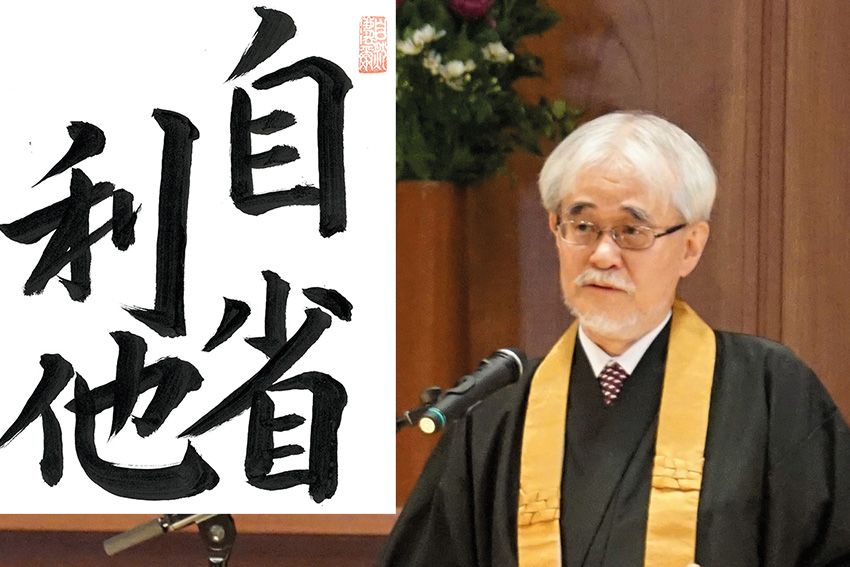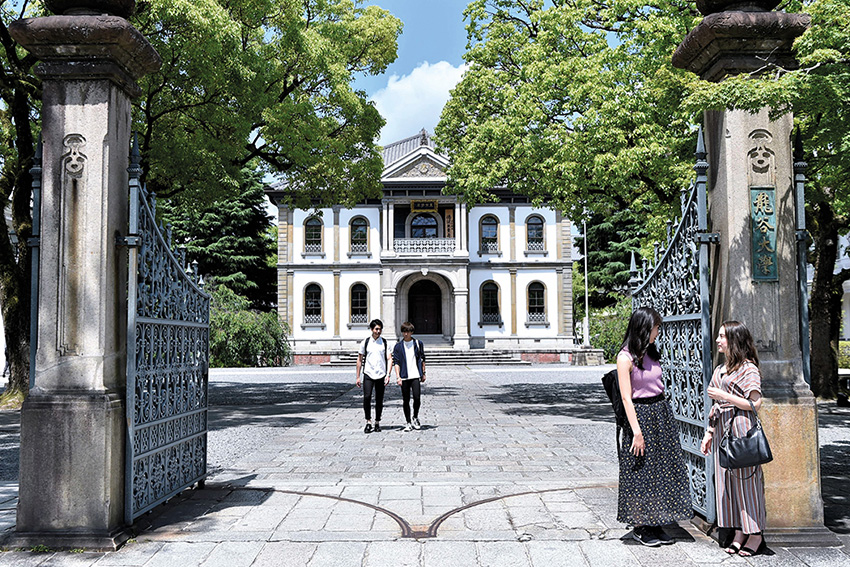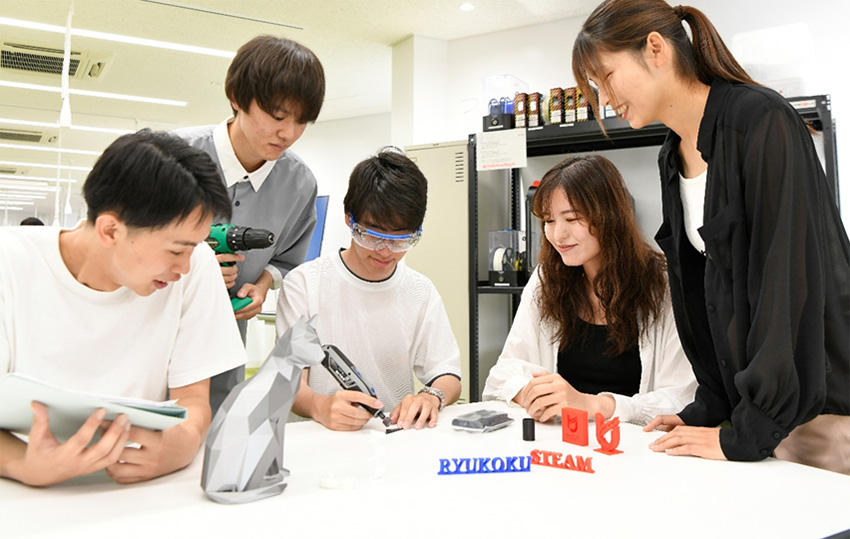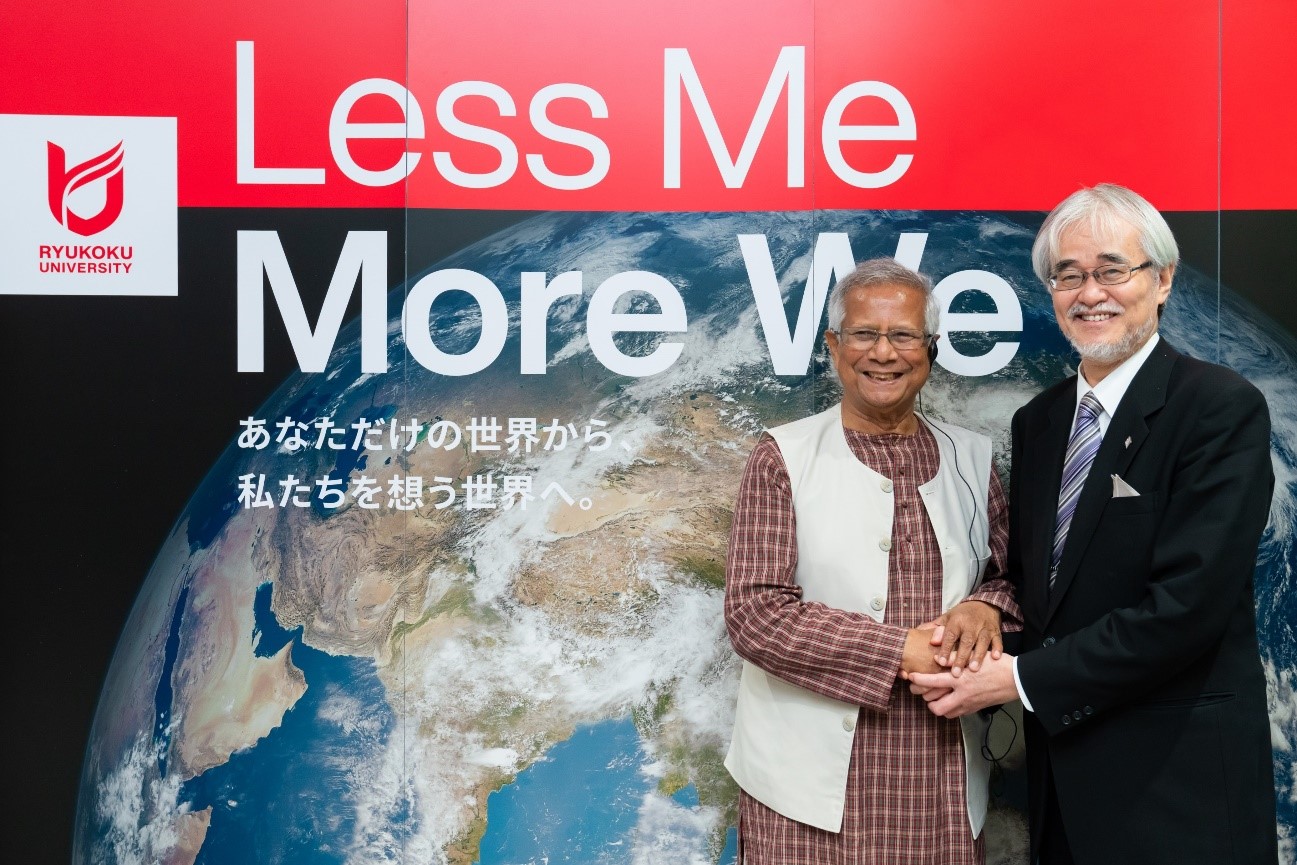Ryukoku University marks its 385th anniversary by championing the integration of Buddhist teachings with contemporary education and global initiatives. Amid its rich history, the university emphasizes a holistic approach to education, addressing social and environmental issues through unique collaborations and international partnerships. Highlighting their innovative "Nature-Positive" declaration, and through promotion of the concept jisei rita (introspective altruism), as depicted in the kanji characters of the first image below, Ryukoku remains committed to fostering global change, inspired by the synergy of ancient wisdom and modern science.

The year 2024 marks Ryukoku University’s 385th anniversary. We have faced many challenges since our founding in 1639, particularly in the transition from the Edo Period to the Meiji Period, during which time Japanese Buddhism experienced great growth. It was also the first opportunity for our university to turn its attention to the West. In the Christian world there were theological schools based on Christian principles, and we took note of the educational systems being implemented there. The newly established Meiji government also sought to adopt Western ideas and catch up with the Western world, part of which involved introducing a Western-style education system. Therefore, there was an impression during the Meiji era of a competition taking place between our university and the government in terms of educational systems.

Ryukoku University's Omiya Campus
At that time, Ryukoku University placed a strong emphasis on language learning and sent many students to Europe. Among them were students studying at prestigious institutions like the University of Oxford and the University of Cambridge in the United Kingdom, as well as others studying in Germany and France. It was the most globally oriented period in Ryukoku University's long history. However, while the Japanese government was inclined to accept Western society as a model, our university did not simply imitate Western educational values and methods. At the core of Ryukoku University lies the teachings of Buddhism. Students at Ryukoku University were amazed by the greatness of Western civilization. At the same time, students rooted in Buddhist teachings felt threatened by the rapid evolution of civilization. We focused on integrating the positive aspects of Western education with the spirit of Buddhism. We believe this style of integration constitutes a significant characteristic of our university.
On the other hand, if we examine the present day, the United Nations announced their Sustainable Development Goals (SDGs) in 2015. I assumed the position of University President in 2017, and shortly thereafter, the former UN spokesperson, a Palestinian refugee, visited Ryukoku University from the UN headquarters in New York and delivered a lecture on the SDGs. This provided our students with an opportunity to engage with the serious risks and dangers facing the world. In a subsequent discussion, I explained how the SDGs concept of "leaving no one behind" already exists within Buddhism. He was delighted to learn that there is profound wisdom in the East. At the same time, he conveyed that many challenges are emerging which cannot be addressed by traditional Western values. It was that moment which inspired me to combine the SDGs with Buddhism. This follows the example of our university in the Meiji era, when we integrated the positive aspects of the West with the spirit of Buddhism. The reason for combining the SDGs with Buddhism is that I believe achieving the SDGs requires changing individual consciousness and behavior. What fosters transformation in both consciousness and behavior is Buddhism.
Ryukoku University, as a Buddhist university, was the first to establish faculties of science and technology, as well as agriculture. Our Faculty of Science and Technology was established in 1989, coinciding with Ryukoku University's 350th anniversary. The reason for establishing such scientific faculties at a Buddhist university is as follows: If civilization were likened to a car, I believe science would correspond to the accelerator. Science has sometimes run rampant throughout human history. Just as a car would run wild with only the accelerator, I consider religion to play the role of the brake. In other words, we contemplate the ideal future of humanity and society by combining science and religion. During the 350th anniversary, we declared "Humanity, Science, Religion" as our slogan. We have continued to embrace that spirit to this day.

Ryukoku University is currently striving to create new values. Social issues such as poverty, conflict, and providing education to all, represented by the SDGs, are becoming increasingly severe. I aim for the university to become a hub for social change. The means to solve various social problems can be achieved through collaboration with government agencies, businesses, other universities, and various organizations.
Here's an example of our initiatives: An eight-story building is scheduled to be completed in front of Kyoto Station in 2027. This building will serve as a hub for Ryukoku University, corporations, and financial institutions, to nurture individuals who aim to solve social issues. Participants in this project are Kyoto Shinkin Bank from the financial sector, Osaka Gas Urban Development Corporation as the developer, and Ryukoku University. The first and second floors will be the area of Kyoto Shinkin Bank and will house Le Cordon Bleu, a well-known French culinary academy, and Warehouse TERRADA, renowned as an art space in Tokyo. The third and fourth floors will be managed by Ryukoku University, while the fifth and sixth floors will accommodate Ryukoku University's student dormitories, where some international students will also reside. The seventh and eighth floors will have condominiums for the general public, managed by Osaka Gas Urban Development Corporation. These won't be ordinary condominiums, however; It is our hope for the residents to be comprised of entrepreneurs tackling social issues, who will in turn have a positive influence on our students. On a global level, this may seem like a small-scale project. However, I am confident that such a collaboration of financial institutions, corporations, and universities who are jointly addressing social issues will make it one of the rare projects worldwide.

Image of the eight-story building scheduled to be completed in front of Kyoto Station in 2027
In September 2023, I had the opportunity to provide a lecture at National Taiwan University. During that lecture, when I discussed the plans for this project, many Taiwanese students showed interest and expressed their desire to live there. I feel that there is an increasing number of young people who are willing to tackle difficult social issues. I believe that such young people will be the driving force for change at universities in the future. For example, we are faced with serious and complex issues, such as the current situation in the Gaza Strip of Palestine. We often only catch a glimpse of these issues through television or the internet. However, there is an increasing number of young people who are starting to seriously consider these problems and contemplate what they can do to help. There is a growing movement to ponder what is lacking in the world, as well as the essence of living.
At Ryukoku University, we have been accepting students from Ukraine as exchange students. It began with the signing of a student exchange agreement with Taras Shevchenko National University of Kyiv shortly after Ukraine declared independence. Amid the attacks their country is currently facing, we collaborated with this partner university to facilitate acceptance for students who wished to study in Japan. The first Ukrainian exchange student to arrive expressed a desire to study haiku. This was the moment when I first learned that Matsuo Bashō’s haiku had been translated into Ukrainian. I was surprised to see how such Japanese culture has spread widely across borders.
Currently, there are twelve students from Ukraine enrolled at Ryukoku University, and one returned to their home country last year. Before her departure, she expressed gratitude for the university's hospitality and mentioned how much she loved the atmosphere here. Existing ranking systems do not evaluate a university’s atmosphere. However, I believe that the atmosphere of a university is a crucial element in education. Last year, when a major earthquake struck Türkye, our Ukrainian students organized and led a donation drive for disaster relief. They had previously received much assistance from others and felt it was their turn to offer help. This act of reaching out to those in need demonstrated their kindness, and I believe they were influenced by the atmosphere at Ryukoku University.
It is very clear from what you have said that collaborations and having these understandings with the international global audience play an important role in Ryukoku University. As you mentioned, you have students from Ukraine studying here and you were one of the first universities to have an agreement with Ukraine. You also gave a very good collaborative example of your institution partnering with financial and private institutions to create this all-in-one building that you described earlier. This has been a very important role for many institutions in Japan. For example, when we spoke to the Tokyo University of Science and Agriculture, they talked about how finding MOUs and collaborations were extremely important to increasing their influence and network and helping people across the world. Going forward, are you looking to find more international partnerships and MOUs to increase the help that you bring to the global audience?
Yes, we are eager to strengthen our efforts in this field. Let me provide another concrete example. Ryukoku University has a strong interest in addressing urgent environmental issues such as global warming and climate change. To this end, we have entered into an agreement with the Ministry of the Environment, and to support us they have assigned a staff member to serve as an assistant to our University President. Environmental problems such as the destruction of nature are primarily caused by humans. According to Buddhist teachings, humans are inherently selfish beings, often unaware of this nature and typically assuming they are right. This anthropocentrism, in which the sacrifice of nature for human needs is taken for granted, is prevalent worldwide.
There exists a word in Buddhist terminology, shujou. This term refers to "all sentient beings" or "all living beings." Humans are only a small part of all living things. Today, nature is being destroyed due to human actions, and some species are facing the threat of extinction. Without seriously facing this reality, problems related to nature and the environment cannot be solved. On March 1st, 2024, Ryukoku University announced "Ryukoku University’s Declaration on Nature-Positive." Previously, on January 27th, 2022, we announced "Ryukoku University’s Declaration on Carbon Neutrality," and on February 23rd, 2022, the "Ryukoku University Declaration on SDGs." However, we do not intend to stop here. As a prerequisite, researchers have been addressing these issues and have already achieved results. While the term “Nature-Positive” is garnering global attention, no such declaration has been made by any other university in Japan. We believe that it is precisely because we are a university based on the spirit of Buddhism, that we should tackle these Nature-Positive challenges.
In Buddhism, there are two important concepts regarding the world. The first one, connected with that which I mentioned earlier, is shujoseken, which refers to the world of sentient beings. The second one is kiseken, which can be seen as the environment or the container necessary for living beings to exist. Historically, Buddhist practitioners have not taken environmental issues seriously. Reflecting on this, we, as a Buddhist-affiliated university, aspire to address this issue through research and educational activities.
Talking about education, to tackle these larger issues, high-caliber international talent is required to pass on this knowledge and teach the next generation what needs to be done. Japan is prioritizing this attraction of high-caliber talent particularly when it comes to doctoral and master’s students to boost its global education as well as its research competitiveness. The newly established Council for the Creation of Future Education is spearheading these efforts supported by the ongoing JPY 10 trillion university fund from the government and is emphasizing the need for an internationally attractive research environment and reward system to strategically acquire these people. This policy shift not only aims to increase student numbers, but also elevate the overall quality of education and research in Japanese universities. How is Ryukoku University aiding in the attraction of more doctoral and master’s students to Japan to bolster its global education level and research competitiveness?
We were greatly affected by the Covid-19 pandemic. However, we found that we had the advantage of connecting online with universities and institutions all over the world. One major challenge facing universities in Japan is the decreasing number of applicants to graduate schools. Meanwhile, the government continues its efforts to cultivate talented students, highlighting a significant gap. Since I assumed the role of President, the challenge of graduate schools has persisted at Ryukoku University. I believe that innovation is necessary to address this challenge. Collaboration is key here as well. The Ryukoku University Graduate School of Policy Science has launched a new program in collaboration with the University of the Ryukyus in Okinawa and Kyoto Bunkyo University. In this program, individuals facing the same challenges can study at Ryukoku University, the University of the Ryukyus, and Kyoto Bunkyo University through a shared curriculum. Additionally, plans are underway to include working professionals in the program. If universities do nothing, if they make no efforts, we will simply be submerged in society. Universities must advance and lead. The intellect of the youth will respond to such movement.
I believe that one of the challenges faced until this time by universities is that researchers have been primarily focused on their own individual research rather than on education. I strongly feel that Japanese universities have been lagging behind in terms of disseminating research results to society. We are committed to focusing on conveying the content of our research to society. Such efforts have been particularly lacking in fields such as literature, history, and humanities, and their content is not widely known.
On March 2nd, we will hold the Digital Humanities symposium at Ryukoku University. Ryukoku University boasts numerous cultural assets. I have also established a network with research institutions and researchers focusing on the Silk Road civilization heritage and its preservation, which is my area of expertise. The symposium will invite researchers from the British Library in the United Kingdom and the Japan-Mongol Cooperative Bichees Research Project in Mongolia to share research on the value and preservation of these cultural assets alongside Japanese scholars. Additionally, efforts are underway to convey the achievements of each research institution through the incorporation of digital technology.
Throughout this interview, you have talked about the unique values and unique higher education that Ryukoku University provides. The mission of this report is to promote the international relations of Japanese universities to the world. As such, many of our readers do not know what to expect when it comes to studying in Japan. As the president of this amazing university, what ecosystem are you providing for foreign students who come to Ryukoku University to study, and what are you doing to attract more foreign students to come here and learn about your values and help to change society together with your education?
We believe it is important to first provide an atmosphere of excitement for those who come to study abroad. I believe this is key. Furthermore, we would like the students to participate in and engage with many ongoing projects and programs. For example, the Yunus Social Business Research Center (YSBRC) was established in collaboration with Dr. Muhammad Yunus, who received the Nobel Prize in 2006 for introducing the concepts of microcredit and microfinance. The YSBRC aims to eradicate poverty in alignment with the SDGs, and promotes initiatives that cannot succeed with Japanese efforts alone. Some of our students, including those from overseas, have been connecting online with Dr. Yunus to participate in an initiative called the [3 ZERO Club]. This initiative is centered upon entrepreneurial efforts to achieve the ‘Three Zeros’ of carbon emissions, concentration of wealth, and unemployment. The students discuss which actions should be taken to tackle these issues while receiving advice from Dr. Yunus. We would like to provide a space for young people to experience the joy of learning and to contemplate ways to create the future by addressing the challenges facing society. This is what we want to convey to international students.

President Takashi Irisawa with Dr. Muhammad Yunus of the Yunus Social Business Research Center (YSBRC)
On the subject of creating the future and changing society, we would like to ask you about the Ryukoku Strategic Plan 400 (RSP400). Could you please highlight what the strategy is about and what is the main mission you want to achieve through this plan?
For our 380th anniversary, we promoted the concept of jisei rita, or introspective altruism, based on the Buddhist spirit. Jisei rita is a concept born from a return to the origins of Buddhism and deep contemplation. As mentioned earlier, humans are fundamentally self-centered beings. Due to unawareness of this fact, conflicts arise. Even when considering ourselves, we exist alongside others such as caregivers, supportive teachers, and friends, highlighting the importance of relationships. Reflecting on human endeavors both individually and collectively as part of society is crucial. I believe that embracing the notion of jisei rita can lead us toward the future that humanity should aspire to.
In 2039, I may no longer exist in this world. However, we have set a long-term goal called "Ryukoku University Basic Plan 400." I believe that the goal of this plan is to share the awareness of self-reflection and joint contributions to society. I envision Ryukoku University as a model for an ideal world, embodying the practice of self-reflection and altruism. By doing so, I believe we can garner attention from people across the globe. I appreciate that Worldfolio has provided us with this particular opportunity to spread our message to the world.
To read more about Ryukoku University, check out this article about them
0 COMMENTS